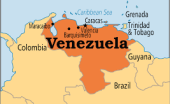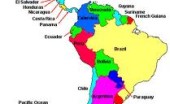Johannah Bernstein post: "eternally proud of my father’s extraordinary aeronautical engineering. legacy. here is a photo of the Canadair Water…
Americas/Western Hemisphere October 2025-
Written by Diana Thebaud Nicholson // November 3, 2025 // Americas, U.S., Venezuela // No comments
Trump’s Violent New Monroe Doctrine
Ana Palacio
US airstrikes in the Caribbean reflect President Donald Trump’s view of intra-American relations as hierarchical. Whereas previous US presidents tried to reconcile Woodrow Wilson’s idealism with Theodore Roosevelt’s realism, Trump merges both impulses into a single, volatile creed: exceptionalism without responsibility or restraint.
(Project Syndicate) “We’re just going to kill people that are bringing drugs into our country,” US President Donald Trump recently told reporters in the White House. His administration had already begun to do just that, using air strikes in the Caribbean Sea and the eastern Pacific Ocean to destroy suspected drug-smuggling vessels and kill those on board – at least 64 people so far. With Trump now threatening to conduct similar operations on land, the contours of a violent new US foreign-policy doctrine are becoming sharper.
This new doctrine carries echoes of the one President James Monroe articulated in 1823, which held that the US would regard any foreign intervention in the Americas – specifically, European colonialism in Latin America – as a hostile act. In 1905, President Theodore Roosevelt expanded on this idea with his “corollary to the Monroe Doctrine,” which stated that the US had a “responsibility to preserve order and protect life and property” in the countries of the Western Hemisphere. Lest this sound benevolent, it is worth recalling Roosevelt’s 1904 assertion that the US – as a “civilized nation” – may be “forced” to exercise “international police power” in response to chronic unrest or “wrongdoing” in Latin American countries. In other words, the US would decide what behavior was acceptable in sovereign countries in its “sphere of interest” – and was entirely justified in punishing whoever did not comply.
1 November
‘You’re either poor or rich’: the Argentinians struggling under Milei’s chainsaw austerity
(The Guardian) Despite falling inflation, a majority are failing to make ends meet as wages and purchasing power have nosedived
After taking office in December 2023, Milei, an economist and former TV pundit, launched a deep “chainsaw” austerity plan, cutting federal spending, freezing wages and pensions, halting public works and slashing subsidies.
To meet his zero-deficit target, he also introduced a “shock therapy” approach to the peso, initially devaluing it by almost 55%.
On one hand, the libertarian managed to bring inflation down from more than 211% in 2023 to 32% annually by September 2025 – still high by global standards, but a level Argentinians had not seen in years.
On the other hand, average incomes have fallen sharply, dragging down purchasing power, while household debt has risen and the poverty rate climbed above 50% before recently easing to 31.6%.
A timeline of US attacks off South America and what Congress has had to say
(AP) — In less than two months, President Donald Trump and Defense Secretary Pete Hegseth say, the U.S. military has killed at least 57 people in 13 strikes against drug-smuggling vessels in the Caribbean Sea and eastern Pacific Ocean.
Trump has justified the attacks as a necessary escalation to stem the flow of drugs into the United States. He has asserted the U.S. is engaged in an “armed conflict” with drug cartels, relying on the same legal authority used by the Bush administration when it declared a war on terrorism after the Sept. 11, 2001, attacks.
But as the number of strikes has grown, a debate in Congress has escalated over the limits of the president’s power. The attacks have occurred without any legal investigation or a traditional declaration of war from Congress, and some lawmakers have raised questions about the lack of hard evidence to justify the killings.
Meanwhile, an unusual naval buildup off South America has stoked fears of invasion in Venezuela and speculation that Trump could try to topple President Nicolás Maduro, who faces charges of narcoterrorism in the U.S.
US launches strikes on 4 alleged drug-running boats in the eastern Pacific, killing 14
26 October
Big win in midterm vote for Argentina’s President Milei boosts markets and vindicates Trump
Argentine President Javier Milei has hailed his party’s resounding victory in midterm congressional elections as a mandate to press forward with radical free-market reforms.
(AP) — Markets in Argentina rallied, the peso surged and government bonds jumped on Monday as President Javier Milei hailed his party’s resounding victory in midterm congressional elections as a mandate to press ahead with radical free-market reforms of Argentina’s long-troubled economy.
The price movements following Milei’s party more than doubling its representation appeared to validate the Trump administration’s bet on its close ideological ally in South America.
16 October
US is working on doubling aid to Argentina to $40 billion by tapping private funding sources
(AP) — The Trump administration is looking to provide an additional $20 billion in financing for Argentina through a mix of financing from sovereign funds and the private sector.
That would come on top of the $20 billion credit swap line that the U.S. Treasury pledged to Argentine President Javier Milei and his government this month to bolster the South American nation’s collapsing currency.
At a White House meeting Tuesday with Milei, Republican President Donald Trump said his administration wanted to help “our neighbors” with the aid package, but he also suggested that the money could be pulled if Milei’s party did not prevail in the Oct. 26 midterm elections.
21 October
The Real Target of Trump’s War on Drug Boats
The Administration has blown up seven vessels in the Caribbean in recent weeks, but the President has been pushing for more dramatic military action in Latin America since his first term.
By Jonathan Blitzer
(The New Yorker) In late September, the White House sent a notification to Congress declaring that the U.S. was in an “armed conflict” with drug cartels, which the government has designated as “terrorist organizations.” Those it killed in international waters were deemed “unlawful combatants.” In an escalation of hostilities against Venezuela, the Department of Defense has recently moved some ten thousand troops into the region, mostly to former military bases in Puerto Rico. Eight American warships and a submarine are now in the Caribbean, and, according to the Times, the Trump Administration has secretly authorized the C.I.A. to conduct covert actions inside Venezuela. Last week, Alvin Holsey, the admiral in charge of the U.S. Southern Command, which oversees all military operations in Central and South America, abruptly resigned; the job is typically held for three years, but he had served for less than one.
Legal scholars and experts in the history of executive power have expressed alarm that Trump is acting well beyond the limits of national and international law.
… Venezuela’s Socialist government has, for years, propped up other leftist leaders across the region, chiefly in Cuba. There is a clear electoral constituency in South Florida, a vital Republican stronghold, that has opposed Maduro and demanded American action against his government. …


